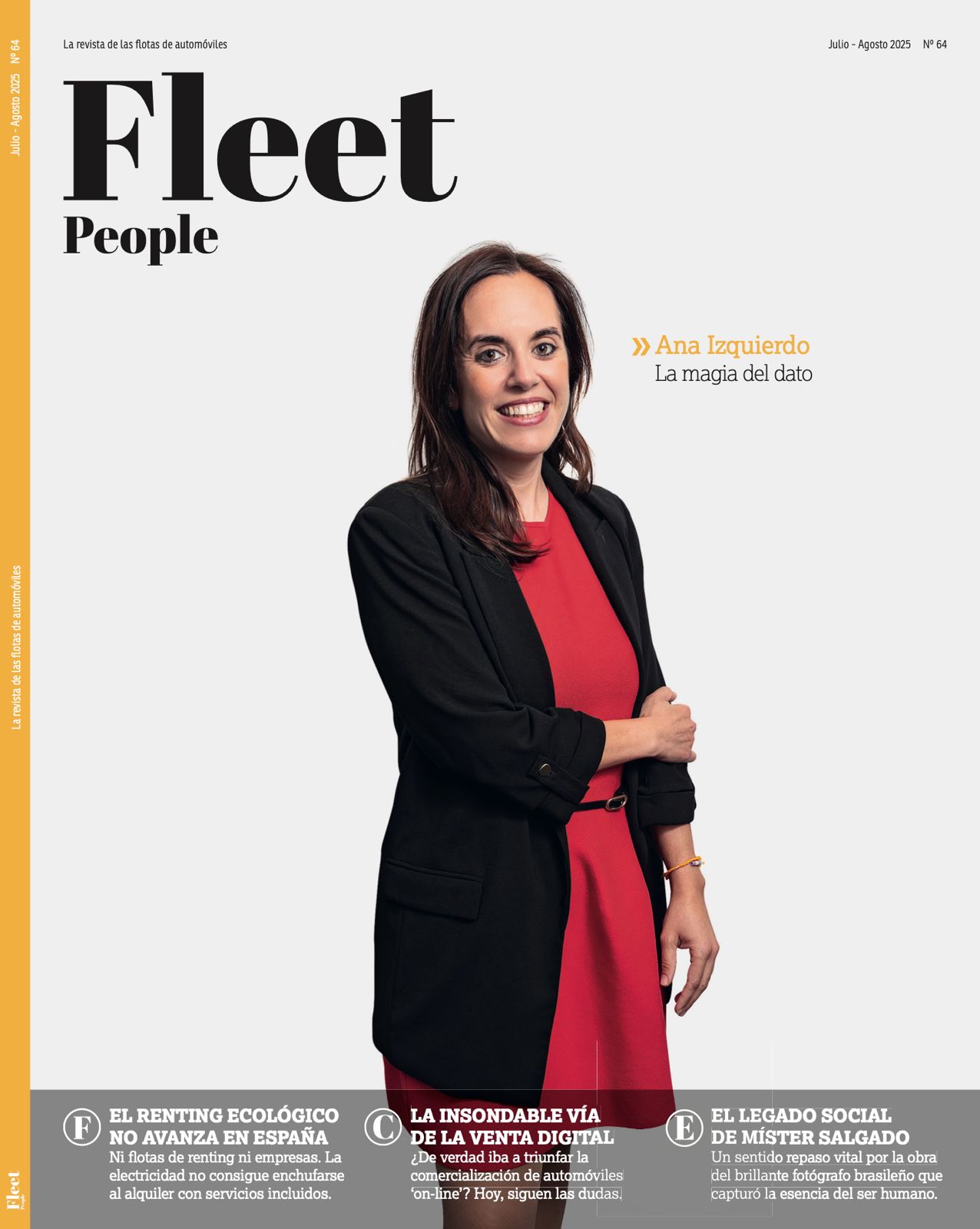Alphabet’s global CEO expresses his surprise at how little control companies claim to have over the environmental emissions of their vehicle fleets and is confident that improved infrastructure in Spain will allow the corporate electric vehicle market to develop more widely.
QUESTION- Both operating lease and leasing solutions are making strong inroads into the automotive market, especially those focused on individual customers and flexible options. How is Alphabet working in this area?
ANSWER- We have also strongly noticed this trend in the business-to-business (B2B) area, fed back to us by our fleet customers. In response to this, we have adapted our processes and offerings, enhancing our range to include flexible solutions across contracts, propulsion and products such as rental solutions and mobility budgets. Amidst the global demand for convenient and flexible mobility, we have also focused on digitising our processes and services, to ensure that our customers can make use of our mobility solutions from anywhere and for periods ranging from minutes to months.
By 2023 we will maintain or expand our position as the world’s fourth largest fleet manager

QUESTION- Alphabet closed last year with a managed fleet volume of 700,000 cars. What are your growth forecasts for the current financial year 2023?
ANSWER- For this year, we want to maintain or even expand our position as the world’s fourth largest fleet management company, despite challenging market conditions. We are also committed to pursuing healthy growth, which means adapting to new market challenges such as digitalisation and sustainability, especially as we help our customers achieve their environmental, social and governance goals. But as each market presents unique potentials, our growth strategies also differ from market to market.
QUESTION- Electrification has become a key objective for all leasing companies, what are the electrification targets for Alphabet’s vehicle fleet and how many such cars do you currently manage out of your total fleet?
ANSWER- Our clear goal is to outpace the current market growth, i.e. to grow faster in electric vehicles than in the segment itself. Our customers are actively transitioning towards electrification of their fleets, and in some markets up to 40% of vehicle orders are electrified, predominantly pure electric vehicles. Today, one in three vehicles in Alphabet’s portfolio is partially or fully electric, representing 34% of total new business. While it is difficult to predict the future of electrification in our portfolio, it is clear to us that electrification is here and will be everywhere. We are committed to advising and guiding our customers in choosing the most appropriate mobility solutions and helping them in their transition to electric vehicles. Although Spain is not one of the forerunners in Europe (mainly due to infrastructure implementation), Alphabet is more than ready to support customers in the electrification of their entire fleet, as they have been successfully doing in recent years.
One in three vehicles in Alphabet’s portfolio is partially or fully electric, accounting for 34% of total new business

QUESTION- How has the semiconductor crisis affected your vehicle deliveries to companies, has the situation now normalised or are there still delays in deliveries that continue to affect many leasing companies in the sector?
ANSWER- The semiconductor crisis, also a consequence of the pandemic, greatly affected vehicle availability and caused a significant change in customer behaviour. In addition, as a consequence of the economic uncertainty, the demand for more flexible solutions increased, which led to a significant expansion of our leasing business. Moreover, despite the challenges, we maintained a steady order volume in 2022, suggesting sustained demand for our services. The effects of the crisis are still being felt, but we see significant signs of recovery. Looking ahead, we expect strong growth in 2023, especially for all-electric vehicles.
QUESTION- In the last few days, the merger between the two rental and mobility giants, ALD Automotive and LeasePlan, has been consolidated. Do you think there will be more mergers of this type in the near future or has the sector already consolidated?
ANSWER- As the industry adapts to the rapid changes in mobility, we may see more consolidation. However, Alphabet remains focused on our unique strengths and innovative strategies to grow our market share and deliver the best services to our customers.
QUESTION- Alphabet recently published a report stating that only 37 per cent of companies actively monitor their carbon dioxide emissions and 17 per cent have no active monitoring or knowledge of their carbon dioxide emissions. What is your view of this – surprising – situation?
ANSWER- It is worrying that only 37% of companies actively monitor their carbon dioxide emissions, given the transport sector’s significant contribution to global emissions. At Alphabet, we are taking action to reduce our own emissions and help our customers achieve their sustainability goals. Our holistic approach to sustainability spans economic, environmental and social pillars. The transport sector plays a substantial role in global carbon dioxide emissions, accounting for approximately 15% of the total amount in the EU and worldwide. In addition, company fleets contribute significantly to these emissions, with some 12 million company cars in circulation each year. By 2030, this figure is expected to reach 100 million. As a company, we have taken a serious look at our own carbon footprint and found that 30% of our emissions come from our own fleet. This has made us acutely aware of how company fleets not only contribute significantly to carbon dioxide emissions, but also represent a crucial factor in the sustainability goals of many companies, including our own. In light of these findings, we started our sustainability journey in 2020, aiming to drastically reduce our CO2 emissions from 30% to 10%. We are committed to using our experience to make a real difference. From an economic perspective, the team is focused on developing products and services designed to help our customers on their own sustainability journey. On the environmental front, we continually strive to reduce our own carbon dioxide emissions as part of our commitment to combat climate change. On the social pillar, we are dedicated to fostering a safe and inclusive environment for all our employees, free from all forms of discrimination. As individuals, including myself, we must continue to show our support for the issue of sustainability by doing our part every day, even if it is just a little bit like eating less meat or driving an electric vehicle.
The effects of the crisis are still being felt, but we see significant signs of recovery. Looking ahead, we expect strong growth in 2023

QUESTION- As a member of the BMW automotive group, what proportion of your managed fleet is currently made up of BMW and MINI vehicles?
ANSWER- First and foremost, Alphabet is a high-quality, multi-brand leasing company. Our goal is to provide the best mobility solutions to our customers, which means offering a diverse fleet to meet their different needs. While BMW and MINI form a healthy part of our fleet, we also include a wide range of other vehicle manufacturers.
QUESTION- After entering countries such as Canada and Finland in 2022, what are Alphabet’s current expansion plans?
ANSWER- Our expansion strategy is guided by the needs of our international customers, and we are constantly evaluating opportunities in other markets. Our expansion often involves partnering with local companies, as we have done in Canada, Brazil and potentially in Asia and South America. We are currently talking to two new potential partners to integrate them into Alphabet OneNet, our global partner network.
As the sector adapts to the rapid changes in mobility, we may see further consolidations

QUESTION- What new business formulas is Alphabet working on to address the shift in customer car habits driven by the New Mobility?
ANSWER- With the change in customers’ car consumption habits, Alphabet is, of course, constantly developing new business formulas. This includes enhancing our leasing solutions with a greater focus on electrification, expanding our mobility services such as shared mobility and Mobility as a Service (MaaS), and integrating digital technologies to create a seamless and flexible user experience. The goal is to offer customised and sustainable solutions that meet the needs of the new mobility era. Alphabet has recognised a significant demand for consulting in the electrification sector, a response to customers’ growing desire for greater flexibility. In the changing landscape of mobility solutions, company fleets continue to maintain their importance as, among other advantages, they provide valuable benefits for employees. However, the demand for flexibility and efficiency is driving substantial changes in the way these fleets are managed and utilised. Chief among these changes is digitisation, which facilitates fully digitalised processes in all areas of fleet management. This makes operations more convenient, contributing to a streamlined and user-friendly experience. In addition to addressing the need for flexibility, we see a trend towards flexible offerings in all aspects of fleet and mobility management. This includes options such as mobility budgets and subscription services, which provide a more adaptable and user-centric approach. Finally, the rise of alternative propulsion is transforming the face of our fleet. With the emergence of new technologies such as hydrogen fuel cells and the advent of autonomous vehicles, the way we think about and use our fleet is changing dramatically. At Alphabet, we are committed to embracing these technologies as we move forward on our journey towards sustainability and greater flexibility.









